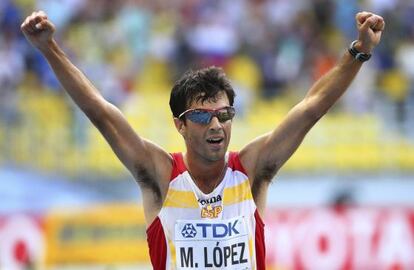Lessons in endurance
Race walker López picks up Spain’s first Moscow medal after marathon runner Aguilar sends message of hope to fellow veterans

Miguel Ángel López came third Sunday in the men’s 20-kilometer race walk in Moscow, clocking in at 1:21.21 for Spain’s first medal of the World Athletics Championships. Gold went Russia’s Aleksandr Ivanov, who brought a sparse Luzhniki Stadium crowd to its feet, in 1:20.58, 11 seconds ahead of China’s Chen Ding after judges had disqualified several rivals. López said he took his time early on: “I knew that those at the front were going to fall back and that’s why I was very calm.”
Before Miguel Ángel López’s storming bronze-medal performance in Sunday’s 20km walk race, Spanish team managers had described the World Athletics Championships in Moscow as a platform from which to build for the future. With few genuine medal contenders on the squad, the hope is more to see at least half a dozen competitors reach the finals and gain valuable experience. Two years ago in Daegu, the team managed just two finalists, with Natalia Rodríguez’s bronze Spain's only medal, while Manuel Olmedo managed a fourth place (both in the 1,500 meters).
On Saturday’s opening day, however, an unsung veteran showed huge determination to inspire a potential rearguard effort from her teammates. In searing heat and humidity, Alessandra Aguilar came home fifth in the women’s marathon, the best-ever performance in the event at the worlds by a Spaniard, and matching Rocío Ríos’ fifth place at the 1996 Atlanta Olympics.
The 35-year-old Aguilar made use of her extensive experience (twice an Olympian in Beijing and London) as she allowed the early pacesetters to pull away in front as the mercury showed 27ºC in the Russian capital with 66-percent humidity. One by one, members of that early breakaway group succumbed and the Spaniard rose through the field. Fifteenth after five kilometers turned into 12th after 10; she was sixth after 30 after which she would still reel in Ethiopia’s Meselech Melkamu.
The heat and humidity were horrible, but we knew it would be like that"
Like almost all of the runners that managed to finish, the Galician was clearly struggling as the route looped around Red Square before returning to where it had all started two hours and 32 minutes before. Marathon gold went to Kenya’s Edna Kiplagat (2:25.44), with Valeria Straneo (Italy) second and Kayoko Fukushi picking up bronze for Japan.
“Mentally I felt very strong,” Aguilar, who was moved to tears by her efforts, said after crossing the finish line. “The heat and humidity were horrible, especially as there was no shade anywhere, but we knew it would be like that. It was by far the hardest race I have done.”
On Saturday afternoon Aguilar’s training partner, Diana Martín, qualified for the final of the 3,000m steeplechase.
For the men’s team, Saturday in Moscow had brought little cheer. Kevin López qualified from his opening-day 800m heat as a fastest loser. The Spaniard went into the championships as the eighth-fastest man around two laps this year, but admitted after his third place in the heat that “the sensation was all wrong; I lacked strength.” Both López and Luis Alberto Marco fell by the wayside in Sunday’s semifinals.
Also on Saturday, Spain’s top hammer thrower Javier Cienfuegos failed to qualify for the final after managing just 70.079 meters, only good enough to finish 12th in his group A.
“I did not feel good out there,” the 23-year-old Spanish record holder said. “I could have fixed things on my last throw, but the hammer slipped out.”
For Spain’s men, one of their biggest hopes for metal may come when Eusebio López takes to the runway on Wednesday, where he must first qualify for the final of the men’s long jump. At just 21, Cáceres has already been at a world championships and Olympics, and his leap of 8.37 meters in July puts him third in the rankings for this year. On Thursday European indoor and outdoor champion Ruth Beitia will start her bid for a first world championship medal on her excellent resume.
Tu suscripción se está usando en otro dispositivo
¿Quieres añadir otro usuario a tu suscripción?
Si continúas leyendo en este dispositivo, no se podrá leer en el otro.
FlechaTu suscripción se está usando en otro dispositivo y solo puedes acceder a EL PAÍS desde un dispositivo a la vez.
Si quieres compartir tu cuenta, cambia tu suscripción a la modalidad Premium, así podrás añadir otro usuario. Cada uno accederá con su propia cuenta de email, lo que os permitirá personalizar vuestra experiencia en EL PAÍS.
¿Tienes una suscripción de empresa? Accede aquí para contratar más cuentas.
En el caso de no saber quién está usando tu cuenta, te recomendamos cambiar tu contraseña aquí.
Si decides continuar compartiendo tu cuenta, este mensaje se mostrará en tu dispositivo y en el de la otra persona que está usando tu cuenta de forma indefinida, afectando a tu experiencia de lectura. Puedes consultar aquí los términos y condiciones de la suscripción digital.








































